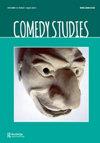Ethical comicality and the Fool: an essay on King Lear
Q1 Arts and Humanities
引用次数: 1
Abstract
Abstract William Shakespeare’s King Lear abounds with features both tragic and bitter. It is, as suggested by many critics, one of the most painful demonstrations of the human predicament in Shakespeare’s oeuvre. But with the introduction of the Fool, Shakespeare artistically threads through the tragic elements of his work a delicate strand of comedy. The Fool is described by some Shakespeare scholars as a bitter character and by some as a mysterious and enigmatic one. This paper does not aim to subvert or polemicize such readings, but attempts to look at the Fool from an ethical perspective: he will turn out to be a comically responsible and ethical figure Shakespeare employs to galvanize his audience and enforce the ethical concerns behind this tragedy. The main focus of this paper, then, is to study the bitterly comic, but responsible, role of the Fool in King Lear in the light of the ethical philosophy of Emmanuel Levinas. It is through Levinas’s account of “the ethical” which is prior to “the ontological” (e.g. language) that this study tries to analyze features of irony and comicality embedded in this tragedy with regard to the Fool.伦理礼让与愚人——李尔王随笔
莎士比亚的《李尔王》充满了悲剧性和苦涩性。正如许多评论家所言,这是莎士比亚作品中人类困境最痛苦的表现之一。但随着《愚人》的引入,莎士比亚巧妙地将作品中的悲剧元素贯穿成一种微妙的喜剧。愚人被一些莎士比亚学者描述为一个苦涩的角色,被一些人描述为一个神秘莫测的角色。本文的目的不是颠覆或争论这些解读,而是试图从道德的角度来看待傻瓜:他将成为莎士比亚用来激励他的观众并加强悲剧背后的道德关注的喜剧责任和道德人物。因此,本文的主要焦点是根据伊曼纽尔·列维纳斯的伦理哲学来研究《李尔王》中“愚人”这个滑稽而又负责任的角色。通过列维纳斯对“伦理”先于“本体论”(如语言)的描述,本研究试图分析与愚人有关的悲剧中嵌入的讽刺和滑稽特征。
本文章由计算机程序翻译,如有差异,请以英文原文为准。
求助全文
约1分钟内获得全文
求助全文
来源期刊

Comedy Studies
Arts and Humanities-Literature and Literary Theory
CiteScore
0.60
自引率
0.00%
发文量
26
 求助内容:
求助内容: 应助结果提醒方式:
应助结果提醒方式:


